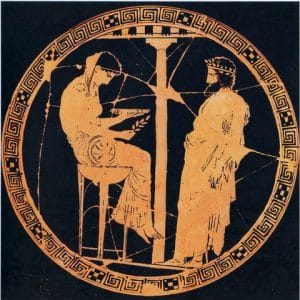Who was Pythia in Greek mythology

Pythia was a young virgin, she wore a young woman’s dress as a symbol of purity. She spoke under the influence of Apollo, not being herself, but the “mouth of the god”.
On the seventh day of the month of Bysius (Apollo’s birthday – mid to late February) initially and then on the seventh of each month, Pythia entered the sanctuary of the temple, having previously been purified in the Castalian spring.
She smoked bay leaves, probably chewed them, and drank Castilian water. To ascertain whether the god was favorable that day, the priests would bring a goat for sacrifice. But before she was sacrificed she had to tremble, supposedly under the influence of the god – just like Pythia in a trance. To help the shivering, they doused the goat in ice water.
Returning to the surface, it is reasonable for Pythia to be confused or to sound like an alloparmate; possibly the result of the stressful conditions and lack of oxygen. It is also possible that Pythia was immersed in visions and prophecies by hypnotism and self-suggestion. Helping to pass into trance was the feeling of sitting on the sacred tripod, where according to tradition the throne of the god was, chewing the leaves of the sacred plant and drinking the new of its sacred spring.
Pythia, the woman who was the mediator between the god and the mortals, was not accidental. She must have been a hypersensitive creature, capable of falling into a state of occupant alienation, not only believing that she was communicating with God but also convincing others of it.
Probably the first Pythia or a specific woman of Delphi had this gift, which created the first reputation of the oracle. After all, the selection of the several Pythias from the priesthood should have been related to their faith and devotion to the worship of Apollo, so it was done only from the surrounding area.
The people there should have lived in an atmosphere of extreme respect for God. The certainty that Apollo considered the future Pythia to be his choise would certainly affect the psychology of some women by cultivating a kind of predisposition for the conquest of the role of the priestess.
Then Pythia would mount the sacred tripod, which was placed at the mouth of the chasm in the sanctum sanctorum, and enter into a trance. In this state she uttered her prophecy, often screaming unintelligibly. It was the job of the priests of the temple, the high priest (Prophet) and his assistants (Hosios) to turn the words of Pythia into a message to the questioner, in the form of hexameter verses. After receiving the oracle, the questioner had to leave; the god gave no further explanations.
The inquirers also had to be cleansed and stand outside the shelter waiting, after they had delivered their gifts to the god, as well as a sweetmeat-offering, which had a fixed price, quite high, and was bought from the oracle: it was a kind of “contribution”, a kind of minimum charge. While they waited, they were to think “virtuous thoughts.” After receiving the oracle, they usually went to an interpreter or tried to understand its meaning for themselves: Themistocles interpreted the “wooden walls” as ships and triumphed at Salamis. Oracles in general were full of riddles and ambiguities, which is why Apollo was called Loxias.
Apart from cities, ordinary private individuals sometimes consulted Pythia: a certain Charephon asked if there was anyone wiser than Socrates? Pythia answered in the negative. A few centuries earlier, a Naxian named Callondas, nicknamed “The Crow”, came to the oracle for purification. He had killed the Parian poet Archilochus, one of the most charming janabetes of ancient lyric poetry. Pythia banished him saying “You have killed the servant of the Muses.” Finally, after his pleas, she sent him to Cape Tainaro, where a necromancer was operating, to summon the spirit of the victim and propitiate him.
It is not yet improbable for the selection of the new Pythia to follow a process like the one made for the selection of a religious leader, such as e.g. of the Dalai Lama in the Tibetan Religion. In other words, they should choose a little girl, who grew up with the necessary theoretical and practical teaching, so that she could serve in the church with dignity, as soon as the previous priestess died.
Before the ordination, Pythia was purified with water from the Castalia spring, as well as the temple, the priests, the staff of the sanctuary, the pilgrims. Castalia also gave her poetic and prophetic inspiration, but the pre-eminent prophetic source was the Kassotis spring gushing into the sanctuary of the temple. Initially, Pythia used to give oracles once a year, on the birthday of Apollo, on the 7th of the month of Vysos. Later, she was giving the oracle on the 7th of each month, except during the winter months when Apollo was absent in the Far North or in the Tempe Valley.
